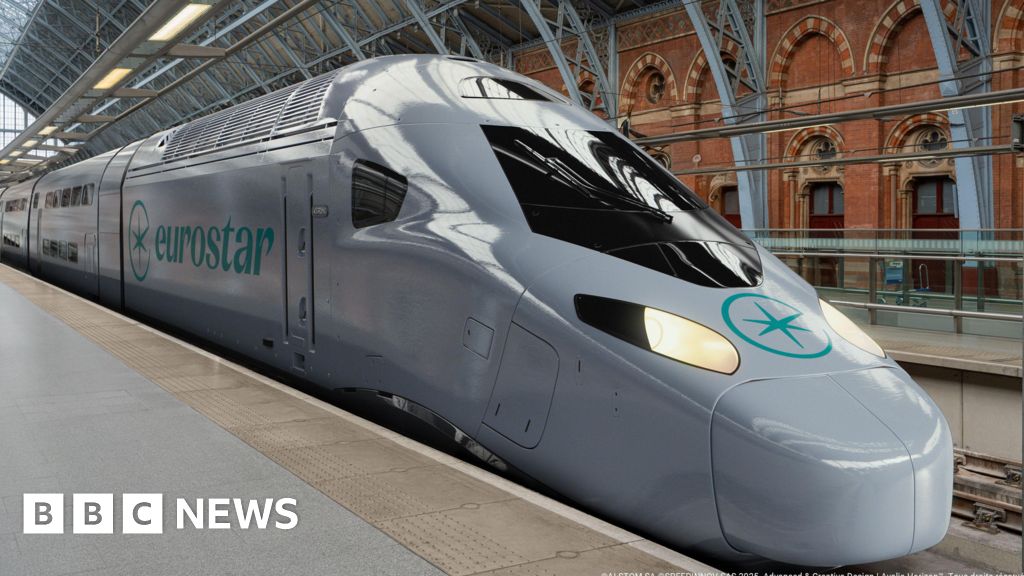
Eurostar has revealed plans to run double-decker trains through the Channel Tunnel for the first time.
The cross-channel rail operator has confirmed it will order up to 50 trains from manufacturer Alstom, eventually increasing the size of its fleet by nearly a third.
The expansion plans would include investing heavily in a crucial London depot, it said.
But questions remain over whether the facility has enough space for both Eurostar and potential rival operators to use it.
In the €2bn (£1.74bn) deal, confirmed on Wednesday, Eurostar has ordered 30 “Celestia” trains, with the option for 20 more.
Eurostar expects to start using the first six trains in 2031.
Each train would be 200m long. If two were run together, as happens currently, the resulting 400m service would have about 1,080 seats.
These would be the first double-decker high-speed trains to run through the Channel Tunnel.
The only other double-decker passenger service to ever appear on Britain’s railways was an experiment that began in 1949.
Eurostar’s chief executive Gwendoline Cazenave said she was “particularly proud to bring double-decker trains to the UK for the very first time”, adding they would bring “exceptional comfort”.
Eurostar carried 19.5 million passengers last year. Ms Cazenove said the company aimed to grow this number to 30 million.
The firm said a fleet of new trains, some of which will replace older ones, will lead to a 30% increase in trains that service London.
The double-decker train deal comes after Eurostar announced an expansion plan in June that includes new routes to Geneva and Frankfurt from London.
The new trains will need to go through a years-long certification process for use in the Channel Tunnel, in all the countries where Eurostar operates.
They will be 4.33metres high, just 16cm higher than the E320 models currently in use.
Tony Miles, railway journalist and commentator, told the BBC that Eurostar selling more seats on double-decker trains could potentially lead to cheaper prices for passengers.
“It costs exactly the same to run the train whether it’s got twice the number of seats or not,” he said.
“You still have only one driver, still use the same track.”
Mr Miles suggested Eurostar had pulled a “cunning move” by announcing the roll-out of larger trains in response to murmurings of increased competition from other rail companies.
He added they had “seized an opportunity” to make the move with some its fleet approaching retirement.
While the high-speed line between St Pancras and the Channel Tunnel was built to European standards enabling it to be used by taller trains, as double-decker trains are common on the Continent, double-deckers becoming the norm across the Britain’s rail network seems unlikely.
Pete Waterman, music producer and railway enthusiast, told the BBC’s Today programme because Britain’s railways were established two centuries ago, most the routes would not be able to cater for such large trains due to obstructions such as tunnels, overhead lines and bridges.
Such costs to adapt the network for double deckers would be “absolutely astronomical,” he said.
“Although Eurostar is to be applauded for announcing this, you can only get into St Pancras because most of British railways you can’t put double deckers on because our railways were built 200 years ago, not just after the Second World War,” he added.
Mark Smith, founder of international train travel website Seat61.com, added the Eurostar announcement was “obviously good news for travellers”, saying upper deck seats offered the “best views” during journeys.
Eurostar also said it would invest €80m developing the Temple Mills depot in London, which is the only depot in the UK able to accomodate the larger trains used in continental Europe.
That depot, owned by the government’s London St Pancras Highspeed organisation, is currently exclusively used by Eurostar.
Eurostar is also the only company currently offering cross-Channel rail services between London and Paris, but others want to set up rival services.
Those companies include Spanish start-up Evolyn, Sir Richard Branson’s Virgin and a partnership between Gemini Trains and Uber.
The Office of Rail and Road is reviewing proposals from these firms to use Temple Mills, as well as Eurostar’s plans to increase services.
The regulator is expected to make a decision on access to the depot within weeks.
Disclaimer : This story is auto aggregated by a computer programme and has not been created or edited by DOWNTHENEWS. Publisher: BBC







